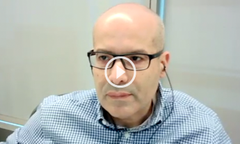
SUNLIGHT Findings Emphasize Role of VEGF Inhibition in Refractory CRC
John L. Marshall, MD, discusses the impact of the SUNLIGHT trial in patients with refractory metastatic colorectal cancer.
Episodes in this series

John L. Marshall, MD, director of the Ruesch Center for the Cure of Gastrointestinal Cancers at Georgetown Lombardi Comprehensive Cancer Center in Washington, DC, discusses the impact of the SUNLIGHT trial (NCT04737187) in patients with refractory metastatic colorectal cancer (CRC).
The oral combination of trifluridine/tipiracil (Lonsurf) has been approved since 2015 in this setting based on overall survival (OS) benefit vs placebo. The phase 3 SUNLIGHT trial was meant to answer the question of whether adding the VEGF inhibitor bevacizumab (Avastin) would improve outcomes further. As many patients received bevacizumab previously, the trial addressed the concept of effectively continuing it beyond progression, Marshall says.
The patients were randomly assigned on a 1:1 basis to receive trifluridine/tipiracil alone or with bevacizumab.
Marshall says that one criticism of the study was that some patients had not received prior bevacizumab, which might differ from the approach used in the United States. However, the majority had received prior bevacizumab. He says this trial established the continuation of VEGF inhibition beyond progression as the standard of care in this setting.
TRANSCRIPTION:
0:10 | We had [trifluridine/tipiracil] already demonstrating benefit in patients in the refractory metastatic setting compared to placebo. But the question was, based on some evidence and clinical idea, that if we kept bevacizumab going and added the VEGF inhibitor back—if you will, bevacizumab beyond progression—that we would continue to see benefit. This was a clinical trial asking that question. Half the patients got [trifluridine/tipiracil] by itself; the other half of the patients got [trifluridine/tipiracil] plus bevacizumab, and the positive results were quite significant. There was not only an improvement in PFS and OS, there's also a few patients who had some response.
1:00 | One criticism of this is that some of these patients hadn't had a lot of prior bevacizumab, like we do here in the United States, but there were a lot of people who did have a lot of prior bevacizumab. What I think this did was prove in this patient population that VEGF inhibition beyond progression is a valuable therapy, and honestly, becomes the standard of care.
















































